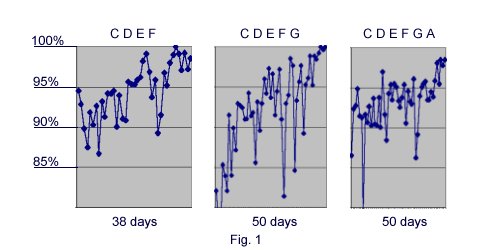
|
|||||||
|
PERFECT PITCHThe vocalist.org webmaster writes about hissearch for perfect pitch.
Can perfect pitch be learned? Does one have to be born with this 'gift'? While it may be true that some people exhibit this ability from an early age, I firmly believe that one does not have to be 'born with' this ability. Consider this - we acknowledge that a small number of musicians do have perfect pitch. We therefore acknowledge that there must be some kind of intrinsic difference between each of the twelve tones in the chromatic scale. Quite simply, if this intrinsic difference was not there, then perfect pitch would not be possible. Those with perfect pitch must be hearing some kind of quality in each tone. Do they have computer-like brains which subconsiously count the number of vibrations per second, or do they have open ears which can pick up subtle diffferences in quality between the twelve tones? Also consider this - many musicians acknowledge that pieces of music often do not 'sound right' when transposed to a key other than the original key. Why does this happen? All the intervals are the same whatever key we transpose to - relative pitch has not changed from one key to the next. So, why does a transposed piece of music appear to take on a different meaning than the composer seemed to intend? I contend that all of us with and without perfect pitch are responding to a sub-conscious realisation that the quality of the notes has changed when we transpose key. In other words, we are on one level hearing the same differences in quality of the twelve tones that those with perfect pitch hear. Each of us has a latent and most likely undeveloped ability to here these tone qualities. Each of us has the ability to learn perfect pitch! I started to train my ears to learn perfect pitch in summer 2000. It is now late 2003 and I have in no way been regular with my ear training. In fact I have only trained my ear for perfect pitch for a total of 138 days. However, the results so far are promising. I started with the well known David Lucas Burge Perfect Pitch Course. However, since I had nobody to practice with I really needed some way of being regularly tested with random tones. I did not just want the tones to be random since a gradual prograssion of tones is advised - ie, start with C,D,E,F - then C,D,E,F,G - then C,D,E,F,G,A etc. I found two pieces of software that have been very helpful;

While I can not yet say that I have learned perfect pitch, I believe the graphs do show that there has so far been a steady trend up to the 95% - 100% correct answers in each range. One is advised to add another note when one is consistently achieving more than 95% correct. Questions/comments? perfectpitch@vocalist.org John Cheshire's profile on Google+ Further reading Chris Aruffo discusses perfect pitch in depth and his ear training software is available from his site ( vocalist.org has not tried his software ) |
||||||